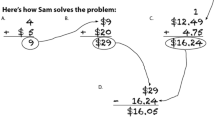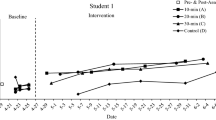The purpose of this study was to compare the isolated effects of cover-copy-compare (CCC) with the combined effects of CCC and two types of performance feedback (i.e., digits correct and incorrect per minute) on sixth grade students’ mathematics fluency and accuracy. An alternating treatments design was employed to compare treatments across 16 weeks. Participants included three general education sixth grade students whose teachers recommended them for additional help with mathematics calculation. No differentiation between treatments was demonstrated for any of the participants and individual differences pertaining to the number of sessions needed to reach and consistently perform at mastery levels were found. Follow-up data at 4 and 12 days following termination of the intervention phase indicated that all participants continued to perform at mastery levels. Generalization to a slightly more difficult mathematics skill yielded pre-intervention to post-intervention increases, albeit small. Students rated all three treatment conditions favorably.


Similar content being viewed by others
References
Barlow, D. H., & Hersen, M. (1984). Single case experimental designs: Strategies for studying behavior change (2nd ed.). Boston, MA: Allyn and Bacon.
Daly, E. J., Lentz, F. E., & Boyer, J. (1996). The instructional hierarchy: A conceptual model for understanding the effective components of reading interventions. School Psychology Quarterly, 11, 369–386.
Daly, E. J., Witt, J. C., Martens, B. K., & Dool, E. J. (1997). A model for conducting a functional analysis of academic performance problems. School Psychology Review, 26, 554–574.
Deno, S. L., & Mirkin, P. K. (1977). Data-based program modification: A manual. Reston, VA: Council for Exceptional Children.
DuPaul, G. J., & Eckert, T. L. (1998). Academic interventions for students with attention-deficit/hyperactivity disorder: A review of the literature. Reading & Writing Quarterly: Overcoming Learning Difficulties, 14, 59–82.
Eckert, T. L. (1999). Acceptability Assessment – Student Version. Unpublished manuscript, Syracuse University.
Eckert, T. L., Ardoin, S. P., Daisey, D. M., & Scarola, M. D. (2000). Empirically evaluating the effectiveness of reading interventions: The use of brief experimental analysis and single case designs. Psychology in the Schools, 37, 463–473.
Eckert, T. L., Ardoin, S. P., Daly, E. J., & Martens, B. K. (2002). Improving oral reading fluency: A brief experimental analysis of combining an antecedent intervention with consequences. Journal of Applied Behavior Analysis, 35, 271–281.
Eckert, T. L., Dunn, E. K., & Ardoin, S. P. (in press). The effects of alternate forms of performance feedback on the oral reading fluency of elementary-aged Students. Psychology in the Schools.
Erez, M. (1977). Feedback: A necessary condition for the goal setting-performance relationship. Journal of Applied Psychology, 62, 624–627.
Fuchs, L. S., & Fuchs, D. (2005). Enhancing mathematical problem solving for students with disabilities. The Journal of Special Education, 39, 45–57.
Gersten, R., & Chard, D. (1999). Number sense: Rethinking arithmetic instruction for students with mathematical disabilities. Journal of Special Education, 33, 18–28.
Haring, N. G., Lovitt, T. C., Eaton, M. D., & Hansen, C. L. (1976). The fourth r: Research in the classroom. Columbus, OH: Charles E. Merrill Publishing Company.
Kastelen, L., Nickel, M., & McLaughlin, T. F. (1984). A performance feedback system: Generalization of effects across tasks and time with eighth-grade English students. Education and Treatment of Children, 7, 141–155.
National Assessment of Educational Progress (2005). Mathematics assessment. Washington, DC: U.S. Department of Education, Institute of Education Sciences, National Center for Education Statistics.
Noell, G. H., Gansle, K. A., Witt, J. C., Whitmarsh, E. L., Freeland, J. T., LaFleur, L. H., Gilbertson, D. M., & Northrup, J. (1998). Effects of contingent reward and instruction on oral reading performance at differing levels of passage difficulty. Journal of Applied Behavior Analysis, 31, 659–663.
Public Law 107–110. (2002). Retrieved December 13, 2005, from http://www.ed.gov/policy/elsec/leg/esea02/107-110.pdf
Richards, S. B., Taylor, R. L., Ramasamy, R., & Richards, R. Y. (1999). Single subject research: Applications in educational and clinical settings. San Diego, CA: Singular Publishing Group.
Riley, R. W. (1997). In math and college-going, middle school makes all the difference. Middle School Journal, 29, 3–7.
Rhymer, K. N., Dittmer, K. I., Skinner, C. H., & Jackson, B. (2000). Effectiveness of a multi-component treatment for improving mathematics fluency. School Psychology Quarterly, 15, 40–51.
Shapiro, E. S. (2004). Academic skills problems: Direct assessment and intervention (3rd Edition). New York: The Guilford Press.
Shinn, M. R. (Ed.). (1989).Curriculum-based measurement: Assessing special children. New York: The Guilford Press.
Skinner, C. H. (1998). Preventing academic skill deficits. In T. S. Watson & F. Gresham (Eds.), Handbook of child behavior therapy (pp.61–82). New York: Plenum Press.
Skinner, C. H., Bamberg, H. W., Smith, E. S., & Powell, S. S. (1993). Cognitive cover, copy, and compare: Subvocal responding to increase rates of accurate division responding. Remedial and Special Education, 14, 49–56.
Skinner, C. H., McLaughlin, T. E., & Logan, P. (1997). Cover, copy, and compare: A self-managed academic intervention effective across skills, students, and settings. Journal of Behavioral Education, 7, 295–306.
Skinner, C. H., Turco, T. L., Betaty, K. L., & Rasavage, C. (1989). Cover, copy, and compare: A method for increasing multiplication performance. School Psychology Review, 18, 412–420.
Struthers, J. P., Bartlamay, H., Bell, S., & McLaughlin, T. F. (1994). An analysis of the add-a-word spelling program and public posting across three categories of children with special needs. Reading Improvement, 31, 28–36.
Stading, M., & Williams, R. L. (1996). Effects of cover, copy, and compare procedure on multiplication facts mastery with a third grade girl with learning disabilities in a home setting. Education and Treatment of Children, 19, 425–435.
Van Houten, R., Hill, S., & Parsons, M. (1975). An analysis of a performance feedback system: The effects of timing and feedback, public posting, and praise upon academic performance and peer interaction. Journal of Applied Behavior Analysis, 8, 449–457.
Van Houten, R., & McKillop, C. (1977). An extension of the effects of the performance feedback system with secondary school students. Psychology in the Schools, 14, 480–484.
Van Houten, R., Morrison, E., Jarvis, R., & McDonald, M. (1974). The effects of explicit timing and feedback on compositional response rate in elementary school children. Journal of Applied Behavior Analysis, 7, 547–555.
Author information
Authors and Affiliations
Corresponding author
Rights and permissions
About this article
Cite this article
Codding, R.S., Eckert, T.L., Fanning, E. et al. Comparing Mathematics Interventions: The Effects of Cover-Copy-Compare Alone and Combined with Performance Feedback on Digits Correct and Incorrect. J Behav Educ 16, 125–141 (2007). https://doi.org/10.1007/s10864-006-9006-x
Received:
Accepted:
Published:
Issue Date:
DOI: https://doi.org/10.1007/s10864-006-9006-x




